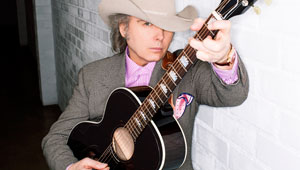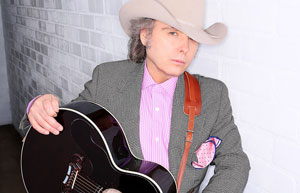
photo credit: Emily Joyce / click for hi-res version

photo credit: Emily Joyce / click for hi-res version

photo credit: Emily Joyce / click for hi-res version
Dwight Yoakam
Swimmin’ Pools, Movie Stars…
Looking at the title of Dwight Yoakam’s new album, Swimmin’ Pools, Movie Stars…, you might see a cheeky nod to the name of the debut album that put him on the map three decades ago, Guitars, Cadillacs, Etc., Etc. And he even reprises the title track of that groundbreaking album on his new effort for a 30th anniversary salute. But he’s hardly resurrecting the style of that freshman album. Instead, he is recasting some of his greatest songs (plus Prince’s “Purple Rain”) in an acoustic mountain-music vein.
Bluegrass “has always been, as Glenn Frey would say, whispering in my other ear,” Yoakam says. “I hope we did justice to the legacy of that genre and kept the spirit of reckless abandon. When you look back on the ‘30s and ‘40s, the bluegrassers were considered the wild men in music – on the white side of culture, with of course R&B and jump blues on the black side. Bluegrass was rock and roll, before there was such an animal. Hopefully we have that spirit in this.”
The seed for this project might have been planted long ago by one of the greats of the genre. “In deference to his recent passing, I need to mention that the first person who ever mentioned it to me was Ralph Stanley,” Yoakam says. “In the early ‘90s, I went in and recorded with Ralph around two Norman microphones with the live bluegrass band that was the Clinch Mountain Boys at that time,” when Stanley had asked him to come in and record a duet of “Miner’s Prayer,” a song from Yoakam’s first album. “And he looked at me after we finished doing ‘Miner’s Prayer’ and said, ‘Me and the band think you ought to think about being a bluegrass singer.’ I said, ‘Well, I guess my birth certificate gives me some credentials to own the holler that I was living in the first couple years of my life…’”
Of course, Yoakam went from living in rural southeast Kentucky – just across the Virginia state line from the area that produced the Carter Family and Stanley Brothers – to finally going west and reviving the California country sound. His legacy over the last three decades includes 10 gold, platinum, or triple-platinum albums, 14 top 10 Billboard hits, and honors from the Grammys, CMAs, ACMs, and the Artist of the Year honor from the Americana Music Awards, proving his enduring appeal in the alt-country world as well as the mainstream. He was at the forefront of the neo-traditionalist movement that many fans and critics think saved country music in the late ‘80s and ‘90s.
But he never pulled anywhere near as traditionalist a move as he pulls with Swimmin’ Pools, Movie Stars… Or is it? As he says, “Let’s wait a minute and — wee doggies! — see what we did to it.” He sees a line connecting the new album with the cowpunk movement he was part of in the 1980s on the L.A. club scene. “Back then, we were letting it rip, doing Bill Monroe music, and that was so long gone at that point, it sounded like rock and roll. So maybe it’s full circle, from there to the last couple of albums” – including his last effort, 2015’s Second Hand Heart – “in terms of the emotional expression of energy.”
The initial tracking took place over four days in Nashville with a core of all-star players that Yoakam describes as “part of Alison Krauss’ Union Station band colliding with the remnants of the Soggy Bottom band.” The ensemble included guitarist Bryan Sutton, fiddler Stuart Duncan, bassist Barry Bales, mandolin player Adam Steffey, and banjo player Scott Vestal, under the production oversight of Gary Paczosa (another Krauss veteran) and Jon Randall (the co-writer of country hits like “Whiskey Lullaby”). “And then I threw a hillbilly version of the Beach Boys at it with my harmony vocals. But that core bunch of players there in Nashville for those four days was a really fortuitous vortex, with those guys responding to what I wanted to do and me saying, ‘Look, let’s leave it loose and ragged at times. Rock and roll got some of its swagger from bluegrass. Let’s go back there and show some of that swagger if we can.’” Yoakam then enlisted the services of mixing star Chris Lord-Alge, who mixed his last two studio albums and added a further edge of Beggars Banquet-esque rock and roll mystique.
The new album is a one-off for the Sugar Hill label, as “Warner Bros. graciously allowed me to take this year off in terms of delivering my next studio album for them to do this project, because they knew it was a passion project for me.” The initial concept was that it would be a covers album, before it ended up being an album of Yoakam covering himself. When his two producers came in for a meeting one day to go over song choices, he recalls them saying, “You know, we started listening to your catalog, and we found songs where we thought, ‘Wow, that was never a single. Nobody ever heard that. Should we do that with him?’” In the end, he says, “I let them come to me with titles that they liked. I didn’t really pick; they did. We ended up with 11 tracks that had been on my earlier albums, but only two, ‘Guitars, Cadillacs’ and ‘Please, Please Baby,’ were ever hits. I don’t know if ‘obscure’ is the word for these songs – people that had my albums have come across them – but they’re the tracks that were songs less traveled. And the songs feel new for me.”
The one non-Yoakam oldie was a fluke. Prince passed away two days into the Nashville sessions, and the emotion of the moment led Yoakam to try a pass at “Purple Rain” in the studio that afternoon. He still remembers what block he was driving down in Hollywood in 1984 when he heard the song come on the radio, when he was driving airfreight and working on his first indie EP, “and hearing that come on stopped my in my El Camino right there.” Within a couple of years, he was at Warner Bros., working with Lenny Waronker, the same exec who signed Prince, and clearly a lover of iconoclasts in any genre. It was Waronker, still a friend and mentor, who convinced Yoakam that he had to put “Purple Rain” on Swimmin’ Pools, Movie Stars… when the singer wasn’t sure whether it was all about the emotion of that April afternoon or whether they’d come up with a genuinely great track.
As always, Yoakam has plenty of other irons in the fire, somehow juggling his seemingly nonstop touring and acting schedules. He just wrapped work on producer David E. Kelley’s new TV series, Goliath, with Billy Bob Thornton, William Hurt and Maria Bello; it premieres on Amazon Oct. 13. On the music front, he recently indulged in “a bit of mischief” by joining Jack White for a day at the Third Man studio in Nashville to cut a one-off vinyl single for White’s label.
If you’re still wondering about the title of Swimmin’ Pools, Movie Stars…, and how Yoakam came to choose something as unlikely as that for the name of an album that harks back to Yoakam’s Kentucky roots… well, yes, it is as flippant as it sounds. But in another sense, for someone who’s as much of a musical historian as Yoakam, it’s completely serious.
“It’s tongue in cheek,” he says, “because the album started in Nashville, and ended up in… well, you know, California is the place you oughta be!” (He did the final vocal sessions in some of L.A.’s more historic studios.) “But also, I thought, well, I’m gonna give a wink back to Flatt and Scruggs and Jimmy Martin and everybody who came out here. This album really is that hybrid expression of a journey — and it’s the American journey. It’s the Dust Bowl ‘30s era blowing colloquial music out to California with all the Okie/Arkie/Texan migrants. Folks from Kansas and Nebraska and the plains all ended up out here and brought with ‘em their cultural elements. Without that, you don’t have Buck Owens out here, and you don’t have Merle Haggard.” And you certainly wouldn’t have the émigré that most roots enthusiasts would crown the reigning king of California country, Dwight Yoakam.●
For more information, please contact Samantha Tillman, Nick Mallchok or Carla Sacks at Sacks & Co., 212.741.1000.